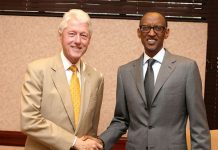The Rt Hon William Hague MP
Secretary of State for Foreign and Commonwealth Affairs
King Charles Street, London SW1A 2AH
Dear Secretary of State,
On 24th September 2013, Rwanda will be holding its third legislative elections since the genocide of 1994. We, Rwandan organisations attached to fundamental freedoms and democracy, are very concerned over the fact that, since the last legislative elections, which were held in September 2009, and the last presidential elections, held in August 2010, the political climate and democratic environment have not improved in Rwanda.
Progress in all most fundamental components of democracy and political pluralism has been prevented by a combination of government-led harassment of political opponents, unwillingness to tolerate critics and restrictions on the development of political parties.
Suppression of political opposition
Since the last Rwandan legislative elections, opposition leaders and activists have continued to be harassed, imprisoned or forced into exile. Opposition parties which have tried to register have been faced with incessant administrative and governmental hurdles that have prevented them to complete or even start the registration process.
The Democratic Green Party, which was established in 2009, has been striving to register until today. In the process, it experienced various obstructions and setbacks including the assassination of their Vice-President in 2010, repetitive refusals by the district council of permission to hold their founding congress – the first and foremost step towards registration. Even if the party managed to get registered within the next two months, the timeframe would now be too restricted for them to conduct an adequate electoral campaign.
Bernard Ntaganda, the founding president of the only opposition party which managed to get registered PS-Imberakuri party, was arrested on 24th June 2010. He was charged and later sentenced to four years imprisonment after being found guilty of breaching state security, “divisionism” for holding public speeches criticising government policies ahead of last year’s elections, and attempting to plan an “unauthorized” demonstration. Criticising the government is thus considered a crime in the current political environment.
Several international human rights organisations have stressed that the, the PS Imberakuri, was infiltrated by ruling party members, and is not acting as an opposition party .
Victoire Ingabire, the leader of the FDU-Inkingi opposition party was charged in April 2010 with “genocide ideology”, “minimizing the genocide”, “divisionism”, as well as “collaboration with a terrorist group”. After a lengthy trial that has been considered by main human rights organisations as ‘flawed’’ and falling short of international standards, she was sentenced to eight years imprisonment for ‘’conspiracy to undermine the established government and denying the genocide’’.
The ’Genocide ideology law used in her case has been criticised by human rights organisations as a tool used by the government to limit freedom of expression and censure any criticisms against the government.
The above cases clarify the Rwandan government’s aversion to allow criticism and to provide space that would enable opposition parties to contribute to development and to nurture a democratic society.
Muzzling of the media
Since the last legislative elections, media freedom has continuously been restricted using the closure of media outlets, harassment, intimidation and imprisonment of journalists who emit criticisms towards the government. Editors of two newspapers, Umuseso and Umuvugizi, were pushed into in exile in April and May 2010 after their newspapers were suspended and they had received death threats.
Two journalists, editor Agnes Nkusi Uwimana and reporter Saidati Mukakibibi, were given prison sentences in February 2011, for articles criticising public policies that were published before the elections. Agnes Nkusi Uwimana was found guilty of threatening state security, “genocide ideology”, “divisionism” and defamation, and Saidati Mukakibibi was found guilty of threatening state security.
On 24th June 2010, Lean-Leonard Rugambage was shot dead before his house in Rwanda while investigating the intelligence service implication to another shooting of an exiled General. Another journalist, Charles Ingabire of Inyenyeri News, on 31st November 2011 was shot down in Uganda while in exile.
The UK Foreign and Commonwealth Office also recognised this limitations to democratic development in Rwanda in its quarterly updates published on 10 Sept 2012 where it stated: ‘’The overall human rights situation on civil and political rights in Rwanda has not changed markedly since April 2012 and most of the areas of concern highlighted in the Rwanda Case Study in the FCO 2011 Annual Human Rights Report remain” Among those concerns identified in the 2012 report included the continuous suppression of free media continues . The above facts clearly demonstrate that the government of Rwanda acts in breach of the Memorandum of Understanding signed between the UK and the Rwandan governments, with regards to the commitment of ‘’respecting human rights and other international obligations’’.
Some of the domestic and international obligations that Rwanda acts in breach include the 2003 Rwandan Constitution which ensures freedom of association, assembly, opinion and the press and the African Charter on Human and Peoples’ Rights and the International Covenant on Civil and Political Rights (ICCPR) guarantee rights to freedom of assembly and freedom of expression.
The upcoming legislative elections, which will not allow space for the voice of political opposition, freedom to debate on public issues without fear of being persecuted, and a free press, will simply not be democratic elections, and this according to the very conclusions and criteria set up by the latest FCO human rights report, which, for instance, states that “The ability of political parties to secure registration ahead of the 2013 parliamentary elections will be a key test”.
Respect of democratic principles and fundamental freedoms is one of the most essential elements to sustain and strengthen peace and economic and social development achieved. Grievances caused by enduring clampdown on freedoms lead to conflict. In the past Rwanda has gone through the worst possible expression of such situation. The UK government should exert pressure on the Rwandan government to put an end to restrictions on political and civil liberties and move towards genuine democracy. Such steps would reinforce the nation’s peace and unity as well as the admirable economic successes so regularly praised by Her Majesty’s Government.
Yours sincerely.
Rene C Mugenzi
For Global Campaign for Rwandans Human Rights
Aloys Manzi
For United Action for Peace






























































